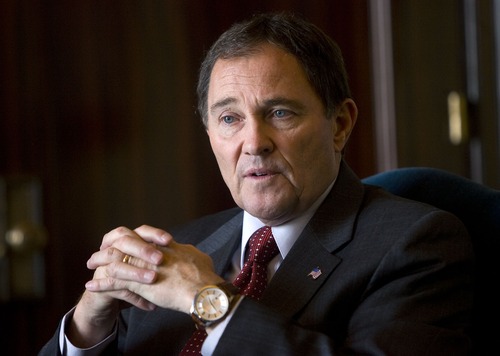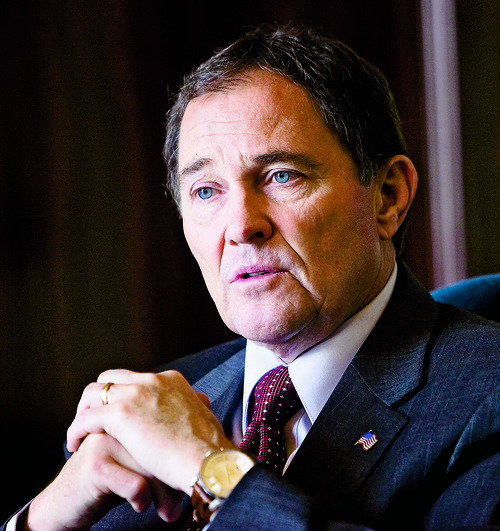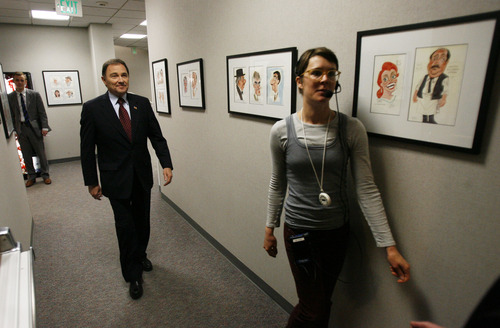This is an archived article that was published on sltrib.com in 2013, and information in the article may be outdated. It is provided only for personal research purposes and may not be reprinted.
Gov. Gary Herbert said Thursday that it made sense for the National Security Agency to monitor Utahns' Internet traffic and text messages during the 2002 Winter Olympics, coming on the heels of the 9/11 terrorist attacks, and he's willing to "cut them a little slack."
"During the Olympics, I think, again, we need to remember it was post-September 11, just five months from this major attack inside our borders, so there probably was a tendency to make sure the public was safe during the Olympics because the Olympics had been targeted by terrorists in the past, so I cut them a little slack in that regard," Herbert said during his monthly KUED news conference.
But in a larger sense, Herbert said, reports of the NSA's vast monitoring programs raise concerns of "Big Brother" and it is up to Congress to ensure there is adequate oversight of the NSA and other agencies.
Marina Lowe, a staff attorney with the American Civil Liberties Union's Utah chapter, said Herbert is giving the government too much latitude when it comes to infringing on Utahns' rights.
—
Ignoring the Constitution? • "I don't see the appropriate response, even with a high-profile event taking place in our city, that we just kind of ignore the constitutional protection of our citizens," Lowe said.
And from a practical standpoint, she said, it doesn't seem to make much sense for the NSA to scoop up vast amounts of data indiscriminately without having some clear objective in mind.
"It's hard to imagine," she said, "how the everyday communications of Salt Lake residents in that environment, communicating about all sorts of mundane things, needed to be monitored in order to keep us safe."
Connor Boyack, president and founder of the libertarian Libertas Institute, noted that, when the NSA announced plans for its Utah facility, Herbert and others were assured the agency would respect citizens' rights.
"We now know those and other leaders have been completely lying to the American public," he said. "Despite the promises and assurances the governor and others were given … the NSA has long been engaging in illegal, unconstitutional and suspicionless surveillance of innocent American citizens, and for the governor to say he wants to give that a pass, that in a post-9/11 world we don't need constitutional protections … we find to be troubling."
Locally, Herbert said, he has no qualms with Utah hosting a sprawling new NSA complex in Bluffdale.
"It's not the building. Having the facility here is not the problem. It's the people inside the building who run the NSA," he said. Having the ability to monitor information is "probably a good thing," the governor said, but whom they're monitoring and what is being stored is the concern.
Lowe said that Utahns should be troubled the data gathering and storage are happening in their own backyards. And Boyack said it's impossible to separate the NSA data center from its mission.
"The building exists explicitly to do things that are constitutionally suspect," he said.
—
Oversight • The Republican governor said there is a need for appropriate oversight.
"We need to make sure the federal government has a proper and appropriate role and there's not some overreach," Herbert said, "that there's not some kind of rogue effort that violates our constitutional rights."
The Wall Street Journal cited unidentified officials in reporting Wednesday that the NSA monitored all emails and texts in the Salt Lake City area during a period of less than six months around the time of the 2002 Olympics. It was one of a flurry of recent reports raising questions about the scope of the secret agency's activities, and whether they are infringing on Americans' civil rights.
Several state officials involved in the Olympics — including then-Gov. Mike Leavitt — told The Salt Lake Tribune they had no knowledge of a massive surveillance operation scooping up all electronic communications at that time.
"I was not provided information on sources or methods of intelligence gathering activities by federal agencies during the Olympic Games," Leavitt said in an email.
The NSA issued a statement late Wednesday denying The Journal's portrayal of a vast surveillance network with capacity to reach three-quarters of all U.S. Internet traffic, saying the agency "does not sift through and have unfettered access to 75 percent of the United States' online communications."
Its statement said "NSA 'touches' about 1.6 percent, and analysts only look at 0.00004 percent, of the world's Internet traffic."
The NSA statement did not address the report of blanket monitoring of email and texts during the 2002 Olympics. A spokesman declined comment on it.
Thomas Burr contributed to this report







